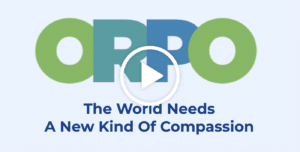
Your organizational culture is the sum of all the interactions between your people. To create compassionate communication within your company’s culture, you must have compassion at the center of every interaction.
The Compassion Mindset is a framework for operationalizing, measuring and applying compassion to all situations. It’s simple enough that everyone can be exposed and powerful enough to inform even your most complex relationships and processes.

The World Needs A New Kind of Compassion
Our methodology teaches people how to practice a fuller definition of compassion that includes openness, resourcefulness, and persistence through conflict resolution. We teach the mindset, skillset and template so your people can engage each interaction to affirm people’s value, capability and responsibility, regardless of the situation or topic. Then we customize applications for your particular needs and challenges.

What’s the big idea? How does it work?
The Compassion Mindset was created for in-house behavioral skills training and development professionals in larger organizations. Through a trainer certification, these professionals can apply The Compassion Mindset principles to:
- Build a safe and inclusive work environment
- Focus on important issues instead of putting out fires
- Develop employees into leaders
- Create greater connection and motivation
- Support a culture of belonging
- Increase employee engagement
- Experience breakthrough results
A proven framework for measuring, teaching, and applying compassionate communication in every interaction, The Compassion Mindset serves as the foundation for transforming your organization. Once certified as a Compassion Mindset trainer, you can lead those in your organization through our groundbreaking Compassion Assessment and Compassion Mindset course and coach participants to apply the principles in their daily interactions.
How Do I Start?
Contact us today and we will help you determine the best next steps.
Bring The Compassion Mindset to Your Company
Over 90% of leaders who’ve applied our framework say it is more practical, more useful and more effective than any other model of compassionate communication and positive conflict training they have used.
Exclusively available to trainers employed by large organizations, The Compassion Mindset certification is obtained by attending a two-hour Compassion Mindset webinar and three-hour virtual or in-person review and Q&A with a Compassion Mindset master trainer. The certification can be obtained completely virtually, making it available to multinational companies and professionals across the globe. Our training is grounded in the Compassion Assessment which measures a person’s capabilities in each of the three areas – openness, resourcefulness, and persistence.
For additional information complete the form below or click here to download The Compassion Mindset Trainer Certification details.
Your leadership teams are the foundation of your organization, and we can help align and engage them. Working with your company leadership, we’ll co-create customized solutions to help you meet the needs of your organization. Through in-person or virtual executive coaching, we’ll help you create a workplace built on trust, positivity, communication – and of course – compassion. If you’d like to connect with a coach, please reach out to us or fill out the form at the bottom of the page.






